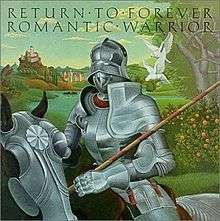Romantic Warrior
Romantic Warrior is the sixth studio album by the American jazz fusion band Return to Forever, released in 1976 by Columbia Records. After releasing their previous album, No Mystery (1975), their fourth for Polydor Records, the group moved to Columbia and retreated to Caribou Ranch near Nederland, Colorado to record their next album. It was also their first to be credited solely to Return to Forever, removing the "featuring Chick Corea" moniker. The album is more avant-garde and less funky than No Mystery, and remains the band's highest selling album with over 500,000 copies sold in the US.
| Romantic Warrior | ||||
|---|---|---|---|---|
 | ||||
| Studio album by | ||||
| Released | 1976 | |||
| Recorded | February 1976 | |||
| Studio | Caribou Ranch (Nederland, Colorado, US) | |||
| Genre | ||||
| Length | 45:28 | |||
| Label | Columbia | |||
| Producer | Chick Corea | |||
| Return to Forever chronology | ||||
| ||||
Production
Recording

Romantic Warrior was recorded in February 1976 at Caribou Ranch, located near Nederland, Colorado.
Music
Chick Corea contributed the longest compositions and the other members each composed one piece. The opener, "Medieval Overture", with its distinctive melodic motifs, sets the mood for the rest of the album. Lenny White's "Sorceress" starts with a funky riff and is distinguished by Corea's synthesizers. The title track, "The Romantic Warrior", is fully acoustic. It has a long intro, which is followed by a short theme consisting of one riff. Each group member, excluding White, plays a long solo. In the end, an extended outro follows, during which fast unison patterns are heard.
Al Di Meola's and Stanley Clarke's songs on side two are notable for their humorous qualities. Al Di Meola's song, "Majestic Dance", relies on rock riffs and distorted lead guitar sound, but features also fast harpsichord-like synth figures. Clarke's "The Magician" is a very complex composition, featuring playful melodies, and again, rapid unison lines. The last track of the album is Corea's "Duel of the Jester and the Tyrant", which is the longest song of the album. It has a more conventional melody as a main theme, but otherwise it follows the style of previous tracks. Notable is the intense keyboard solo showcasing Corea.
After this album Corea decided that the group's time had come to an end and he continued with another wholly new Return to Forever line-up with Clarke. Corea dedicated the album to the founder of the Church of Scientology, L. Ron Hubbard.
Critical reception
| Retrospective reviews | |
|---|---|
| Review scores | |
| Source | Rating |
| AllMusic | |
| Christgau's Record Guide | D+ [2] |
| The Rolling Stone Jazz Record Guide | |
In a retrospective review for AllMusic, William Ruhlmann praised Romantic Warrior as "the sound of a mature band at the top of its game, which may help explain why it was Return to Forever's most popular album, eventually certified as a gold record, and the last by this assemblage."[1]
Robert Christgau was less enthusiastic about the record. In Christgau's Record Guide: Rock Albums of the Seventies (1981), he called it "jazz-rock's answer to Emerson, Lake & Palmer--the worst of both worlds"; and Corea's compositions "pompous", faux classical; while deriding certain members of his group's playing as being on display "in all their dazzling vacuity".[2]
Chart performance
| Year | Chart | Position |
|---|---|---|
| 1976 | Billboard 200 | 35 [4] |
| 1976 | Billboard Jazz Albums | 3 [4] |
| 1976 | Billboard R&B Albums | 23 [4] |
Track listing
| No. | Title | Writer(s) | Length |
|---|---|---|---|
| 1. | "Medieval Overture" | Chick Corea | 5:14 |
| 2. | "Sorceress" | Lenny White | 7:34 |
| 3. | "The Romantic Warrior" | Corea | 10:52 |
| No. | Title | Writer(s) | Length |
|---|---|---|---|
| 4. | "Majestic Dance" | Al Di Meola | 5:01 |
| 5. | "The Magician" | Stanley Clarke | 5:29 |
| 6. | "Duel of the Jester and the Tyrant (Parts I and II)" | Corea | 11:26 |
| Total length: | 45:28 | ||
Personnel
Return to Forever
- Chick Corea – acoustic piano, Fender Rhodes electric piano, Hohner Clavinet, Yamaha YC45d organ, synthesizers (ARP Odyssey, Micromoog, Minimoog, Moog 15 modular, Polymoog), marimba, percussion
- Stanley Clarke – Alembic electric bass with Instant Flanger, piccolo bass, acoustic bass, bell tree, handbells
- Lenny White – drums, timpani, congas, timbales, snare drums, suspended cymbals, alarm clock, handbells
- Al Di Meola – electric guitars, acoustic guitar, soprano guitar, handbells, slide whistle
Technical personnel
- Chick Corea – production
- Al Di Meola – assistant production
- Stanley Clarke – assistant production
- Lenny White – assistant production
- Dennis MacKay – recording engineer, remixing
- Tom Likes – assistant engineer
- Wilson McLean – cover art
- Gerard Huerta – logo
- Remixed at Trident Studios, London
References
- Ruhlmann, W. (2011). "Return to Forever Romantic Warrior (1976) album review | AllMusic". allmusic.com. Retrieved 20 July 2011.
- Christgau, Robert (1981). "Consumer Guide '70s: R". Christgau's Record Guide: Rock Albums of the Seventies. Ticknor & Fields. ISBN 089919026X. Retrieved March 10, 2019 – via robertchristgau.com.
- Swenson, J., ed. (1985). The Rolling Stone Jazz Record Guide. USA: Random House/Rolling Stone. p. 50. ISBN 0-394-72643-X.
- "Return to Forever Romantic Warrior (1976) album review | Awards | AllMusic". allmusic.com. Retrieved 27 October 2013.
External links
- Return to Forever Romantic Warrior (1976) album review by William Ruhlmann, credits & releases at AllMusic
- Return to Forever Romantic Warrior (1976) album releases & credits at Discogs
- Return to Forever Romantic Warrior (1976) album credits & user reviews at ProgArchives.com
- Return to Forever Romantic Warrior (1976) album to be listened as stream on Spotify